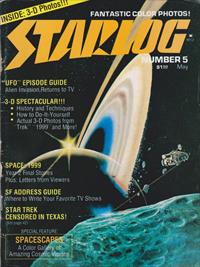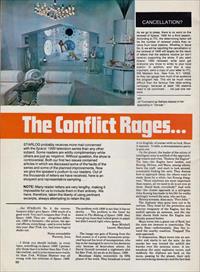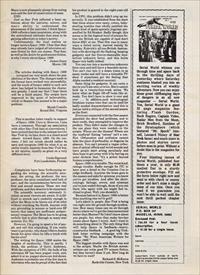Space 1999 Conflict Rages



Starlog 5 (May 1977) finished its episode guide with a special letters section showing how controversial the series was with science fiction fans.
This issue completes STARLOG's episode guide to the first two years of Space: 1999. Issue No. 2 featured story synopses and credits for all of Year One plus the beginning of Year Two. Issue No. 3 included more photos and six more episodes from Year Two.
STARLOG No. 4 contained a personal interview with the most popular personality from Space: 1999, Nick Tate (who plays Captain Alan Carter). Following this final episode guide is a sampling of the flood of letters STARLOG has received from 1999 viewers. As the letters indicate, the show is tremendously controversial, and it's renewal for a third year is presently in grave doubt ...
As we go to press, there is no word on the renewal of Space: 1999 for a third season. According to ITC, the determining factor will be the number of renewal orders they receive from local stations. Whether, in issue No. 6, we will be reporting the cancellation or the renewal of 1999 will largely be the result of letters that the stations receive (or don't receive) supporting the show. If you want Space: 1999 renewed, write (and get everyone you know to write) to your local station. In addition, and this is very important, send a copy of your letter to ITC, 555 Madison Ave., New York, N.Y. 10022, so they can gauge how much of an audience the program has. This will be much more difficult than the famous Trek letter-writing campaign, because at least 100 stations need to be convinced ... not just one network
STARLOG probably receives more mail concerned with the Space: 1999 television series than any other subject. Some readers are wildly complimentary while others are just as negative. Without question, the show is controversial. Both our first two issues contained articles in which we discussed some of the faults of the series and some of the planned improvements. Now we give the speaker's podium to our readers. Out of the thousands of letters we have received, here is an eloquent and representative sampling ...
NOTE: Many reader letters are very lengthy, making it impossible for us to include them in their entirety. We have, therefore, taken the liberty of using pertinent excerpts, always attempting to retain the jist.
(In) STARLOG No. 3, the conventioneers didn't give Space: 1999 much of a good word. You can't compare Star Trek to Space: 1999. They are altogether different. 1999 is fantastic - the actors, the special effects, everything - and is even better this year. Star Trek, too, had some bugs to shake out.
Name unreadable - Waverly, Iowa
I think you should include, in every issue, something on Space: 1999. I personally think that it is better than Star Trek. I like realism, and it is ten times more realistic than Trek. William Shatner was all wrong with his criticism of Space: 1999.
The problem with 1999 is not that it has no stories ... The problem is the lines! As stated in The Making of Space: 1999. they were given lines that looked great on paper but didn't sound right when spoken.
Sean Mitchell - Laurel, Maryland
The image one gets of Koenig from the first season is of a petty bureaucrat promoted beyond his level of incompetence, who has so far managed to survive his decisions only because of benevolent aliens. As David Gerrold invented a nightmare plot for Star Trek, let me do so for Space: 1999. Moonbase Alpha encounters its fifth planet of the week. They broadcast toward it (in English, of course) with no luck. Since it appears liveable, a reconnaissance party is sent out.
On the planet, the leader of the colony of intelligent ants is notified of the approaching vessels and cries, "Destroy the Eagles!" Too late - the Eagles have landed, and Koenig, Helena, and Maya, among others, leave the craft and start to look around, eventually finding the ants. They discuss how to approach them; the others want to study them for a while, but Koenig disagrees, "Since emotions are more important than reason, all we need to do is act nice at them. Stand back, everybody!" And with that (the closest approach to a syllogism John Koenig has made in his life) he walks smilingly toward the ants, who eat him. Helena screams. Alan says, "Poor John." The Alphans' stun guns turn out to be useless. They head for the protection and heavier weaponry of the Eagles, but the anthill sprouts an antenna, and the ray that shoots forth turns the Eagles into chunky peanut butter.
Maya turns into a giant can of Raid, but the ants are immune to insecticides. The party flees - unfortunately, they flee toward the nearby coastline. Trapped! The ants approach.
In desperation, Maya turns into an ant-eater and starts to eat the ants. As she snacks her way toward the anthill she knocks over the antenna tower. A tremendous (for ants) explosion occurs, and suddenly the Alphans are back on the moon, passing by the planet, their only souvenirs being memories and the fact that
Maya is now pleasantly plump from eating ants and the law of conservation of mass.
END
Just as Star Trek reflected a basic optimism about the universe, science, and man's ability to understand the phenomena of the universe, I think Space: 1999 reflects a basic pessimism, along with the anti-rational attitudes that seem to be gaining adherents in today's society.
Unfortunately, the local station no longer carries Space: 1999. I fear that they may already have judged all television science fiction by that one season. That fear, as well as the desire for good science fiction, is why I worry about Space: 1999.
James Jones - Moore, OK
The articles dealing with Space: 1999 ... intrigued me very much about the possibilities of the show. The changes made to the format have worked very successfully, and the touch of humour added to each new show has helped to humanize the characters greatly. I must say that I hope there will be a third season. The scripts have improved to the point of believability, which in Season One seemed to be a major problem.
Marsh Costello - Round Hill, Virginia
This is another letter totally in support of Space: 1999. I love it. However, I also have a comment. Through my association with other Star Trek fans at conventions, I have noticed that due to the intense love for Star Trek by its fans, there is a closed mindedness toward Space: 1999. On the contrary, I feel our minds should rather be open and recognize 1999 for what it is: an entity totally separate from Star Trek but, in my opinion, equally as great on a very different level.
Linda Sigmund - Fort Lauderdale, Florida
Complaints have been forthcoming regarding the writing, the scientific accuracy, the acting, the producer, the new producer, the story consultant (and lack of one), and the inconsistencies between the first and second seasons. These are real problems, and they deserve to be examined.
The scientific accuracy: extremely limited, as most viewers are aware. It is difficult to stretch one's credulity enough to allow the Moon to be blown out of its orbit without wrecking the Earth. Anyone with any grounding in science or hard-core SF knows that lasers are inefficient anti-personnel weapons. The Moon has to be going awfully fast to plow through so many star systems. Etc. Etc.
However, I'm going to upset a lot of people and call this nitpicking. If you really want to get picky, why doesn't Steve Austin break his spine when he lifts a truck with his tin arm?
The writing for Space: 1999 scales the heights of mediocrity. This is partly, I think, the problem of Gerry Anderson. With the exception of UFO, the bulk of his television SF has been puppet work, and, admit it or no, puppet shows are kid shows. Anderson is probably one of the few men in television who can be proud of the fact that his product is geared to the eight-year-old mind.
In UFO, this problem didn't crop up too severely. It was established from the start that these aliens were nasty, rotten, baby-stealing hostiles that wholly justified the finest kind of space-operatic jingoism personified by Ed Straker. Sadly though, this seems to be the highest level of science fiction the British are capable of (and don't throw 2001 at me. That film was in many ways a failed movie, marred mainly by Stanley Kubrick's all-too-British fascination with showing all the flashing, beeping gadgetry and the forever-damnable mysterious unknown force), and this hurts Space very badly indeed.
You can run into a mysterious unknown force once and still have a bearable movie. You can't run into it a dozen times in as many weeks and still have a tolerable TV show (I sometimes got the feeling that Alpha needed a resident exorcist).
Same thing for gadgetry. It can carry a movie you'll see once or twice. But it cannot hold up a twenty -four- week series. We know what an Eagle lift-off looks like already. You don't have to show it over and over ... In addition,such technological fetishism wastes time that can be used for badly needed characterization (and this is just as valid a critique of the second season as the first).
Everyone connected with the first season admitted the show had problems, and to their credit, they attempted to improve the product. They didn't make the changes in the one place they were needed - in the scripts. Where are the themes? Where are the conflicts? Eating "extras" isn't a conflict. Obfuscation and confusion cannot take the place of profundity, or disguise its absence. You can't present a vague collection of optical effects and weird sounds and have people start acting peculiarly and then hope to get away with it by having an actor declaim that "it's a power beyond human comprehension."
Space: 1999 is in trouble. The worst kind, ratings trouble. Badly enough for ITC to have sent a detail to the Creation Con to judge feedback. Anytime the brass goes to the masses and asks for opinions, you know you've got troubles. And after the short-comings, failings, errors, and missteps you've just waded through, those of you out there who agree with me might feel inclined to gloat. Well, you shouldn't.
Because bad as it is, Space: 1999 is better than anything else we've got!!!
Let's admit it, people. Star Trek is being run right into the ground through syndication. How many times can we sit through shows where we've got the lines memorized better than Shatner? So I don't know about you people, but when they make bye-bye noises about Space I worry. And I want to do something about it. The only thing that will help Space is feedback - heavy, constructive feedback ... A good big Trekkish letter writing campaign with the theme "We Want American Writers for Space: 1999"
The biggest trouble with Space was and is the scripts. Maybe the British screen-writers can write good TV science fiction, but they haven't done it yet. How long do we have to wait?
Richard S. McEnroe - Rockville Centre, New York